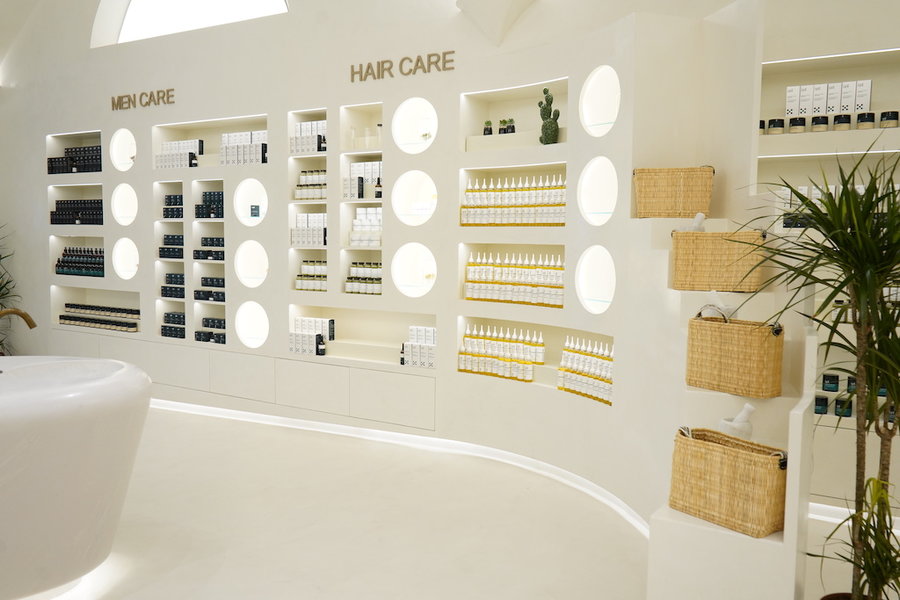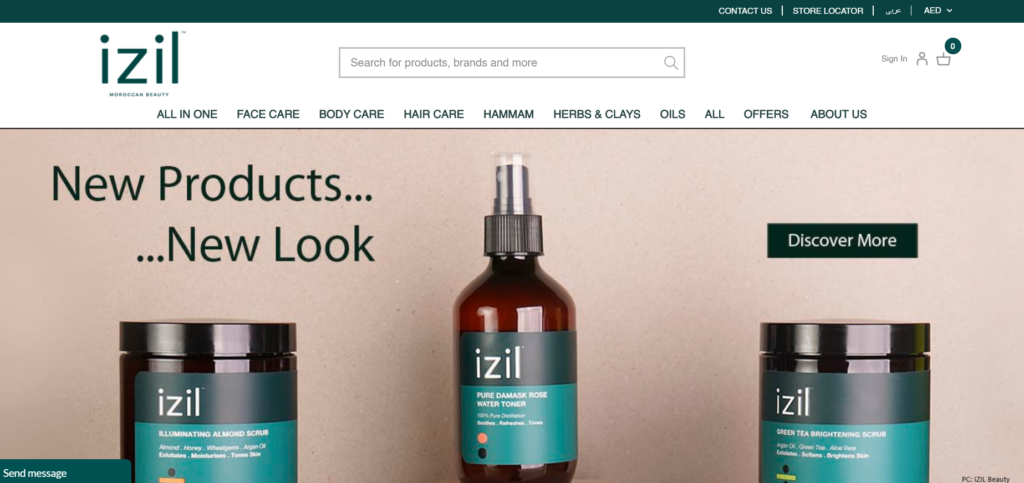
IZIL Beauty store, The Dubai Mall
“Brands reliant only on mall traffic might suffer,” emphasises Mouna Abbassy, founder of authentic Moroccan beauty brand IZIL Beauty. “Such brands are in a high-risk category, and are far more exposed now. On the other hand, an integrated approach – leveraging online and offline channels – is the way ahead. An omnichannel approach has led to growth in our case, even amidst the on-going pandemic.”
As there was a switch from offline to online sales, IZIL Beauty was fortunate to have an established e-commerce channel. It helped the brand to reach customers to their doorsteps, as The Dubai Mall store was temporarily closed for 1.5 months.
Even after reopening, traffic has been less, admits Abbassy. “Around 55% of IZIL Beauty’s sales come from local purchases, the remaining from tourists. That 45% footfall isn’t back yet and there has been a drop in the local purchases at brick-and-mortar. But luckily, our e-commerce business has picked up pace, offsetting losses incurred on brick-and-mortar. Our online sales are growing month-on-month. In fact, our online sales grew tremendously during the pandemic. However, during the lockdown, we faced fulfillment-oriented challenges that required us to sign up with more shipping partners. We also temporarily redeployed our store staff to handle online orders, instead reducing salaries or making redundancies.”
While IZIL Beauty’s online sales grew, Abbassy took the decision to move from the erstwhile kiosk to a full-service flagship store in The Dubai Mall. Officially opened on July 1, 2020, the flagship store brings IZIL Beauty’s collections to life, coupled with a service area where the products can be tried on.

IZIL Beauty e-commerce site
But opening a bigger, flagship store during a crisis is a bold decision, as brick-and-mortar spaces are being re-assessed amid demand for contactless.
The decision is bold, but one that’s well-deliberated, except that the current timing is challenging, Abbassy observes. “It took us seven years to plan for and open a flagship store of this scale, subtle in style but high on experience with full-service that is hard to replicate online. Over the years, we have received customer feedback on products that are effective but difficult to use unless demonstrated. Our service space in the store will meet these demands. We have stuck to our long-term goal of having a single flagship store to express the brand’s depth and proposition, while also supporting our online channel. Having a single channel monolithic approach is, thus, risky; and brands reliant only on mall traffic might suffer,” she repeats.
Notwithstanding the blended experience, does a store spanning approximately 2,155 sqft with service components justify the rent per square feet when footfall is low?
“What we have noticed is that since the spas reopened in Dubai, they have seen healthy traffic. I think opening our flagship store at The Dubai Mall does make sense. Having that said, if it had been normal times, our revenues would have been much higher. But we are optimistic about positive customer reactions towards our service area that will be open from mid-to-end of August,” Abbassy responds. “We are also developing dry samples for people to try our products at home, as a response to contactless. Importantly, we are not losing money, unlike some brands that opted for high-traffic areas within prominent shopping malls. Overnight, the pandemic affected footfall; and bear in mind, the crisis didn’t start with COVID-19, business was affected even before, especially for those brands without a point of differentiation.”
Also read: Faces was prepared for the storm
Change in consumption patterns
A McKinsey & Company study, titled ‘How COVID-19 is changing the world of beauty’, indicates that “skin-care, hair-care and bath-and-body products appear to be benefiting from self-care and pampering trends” amid the pandemic. Abbassy has also seen brisk sale of skincare products, as people stayed at home during the lockdown and didn’t need make-up, but incorporated a skincare regime with longer rituals.
On the other hand, people are being cautious about discretionary spending. “We have seen reduced basket sizes among repeat customers,” Abbassy admits. “They are probably using the products more consciously instead of ordering frequently. But being positioned somewhere between luxury and mass has helped us. Due to the use of rare ingredients, our products aren’t really mass but are more affordable than the luxury brands. We fit most wallets with our affordable positioning, coupled with natural and organic offerings.”
IZIL Beauty that is otherwise known for its authentic Moroccan beauty products added a new category, introducing sanitisers. But this wasn’t necessarily done to pivot. “It was not driven by an opportunity to ride the wave, but by our need for sanitisers in the office, in our manufacturing and R&D units and also in the store,” Abbassy clarifies. “Our affordably priced sanitisers, made from eucalyptus oil, are highly effective yet natural. It has added to our sales from a volume perspective, but we have consciously stayed away from marketing it.”
Going back to normal
Going back to normal will be different. It will also be relative to the definition of normal. Overall, the Middle East beauty and skincare sector is expected to show signs of recovery from Q4 2020, which will become more pronounced in 2021.
“I think we may not go back to the normal of four-five years ago anytime soon, due to economic uncertainties. Even as travel has opened up in the UAE, we may not see a large number of tourists immediately. The recovery timeline will also depend on the availability of a vaccine. But within the next six months, I expect the situation to improve,” Abbassy opines.
Looking ahead, IZIL Beauty remains firm about its future goals of expanding presence across the GCC by leveraging the e-commerce channel. Meanwhile, Abbassy is open to entering new markets with brick-and-mortar formats, following the franchise model. “Overall, in our case, offline will facilitate experiences, while online will offer convenience. Both channels will support each other. In our region particularly, online won’t totally replace offline,” she concludes.
For all the latest retail news from the Middle East, follow us on Twitter and LinkedIn, like us on Facebook and subscribe to our YouTube page.
You must be logged in to post a comment.